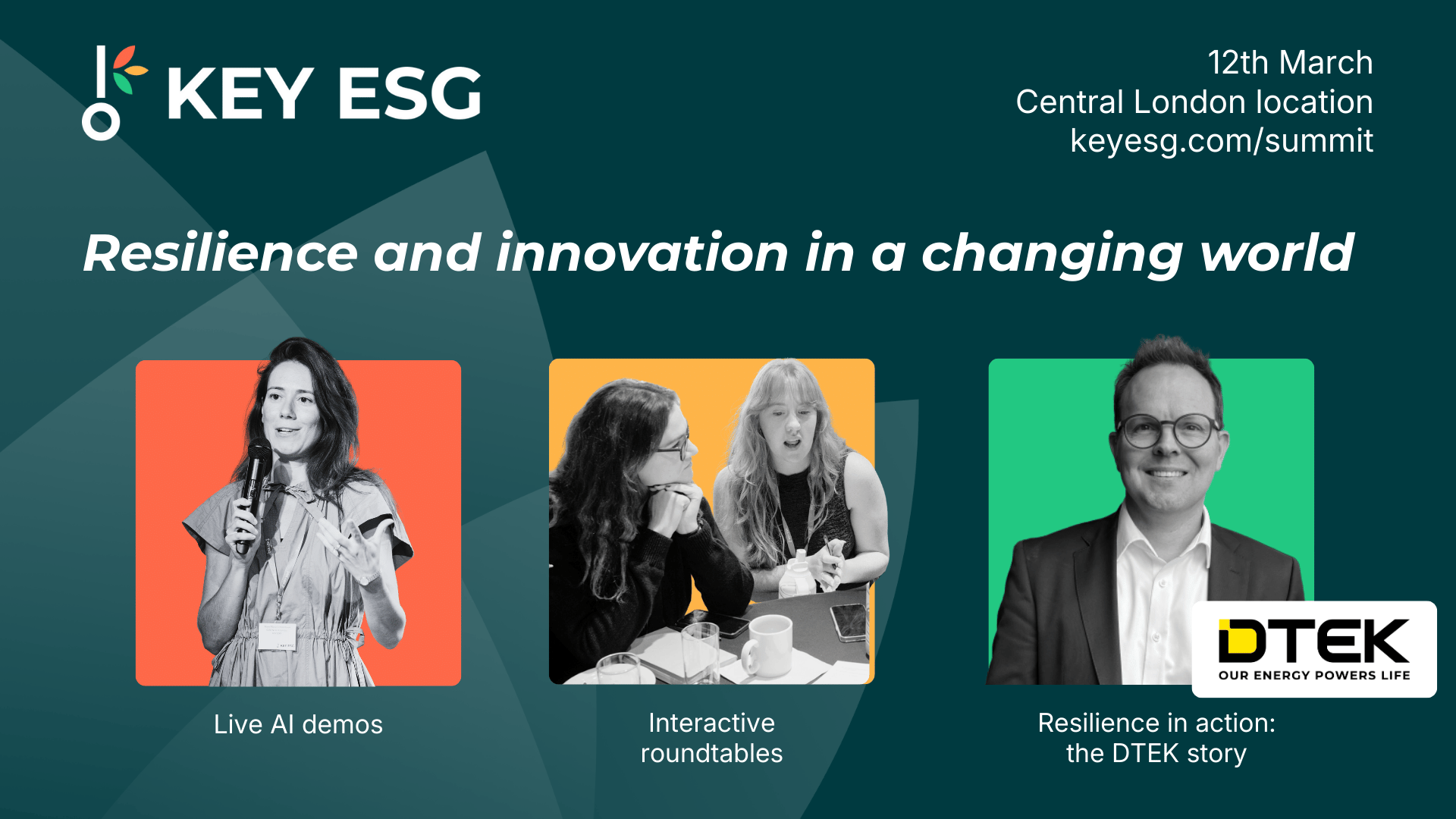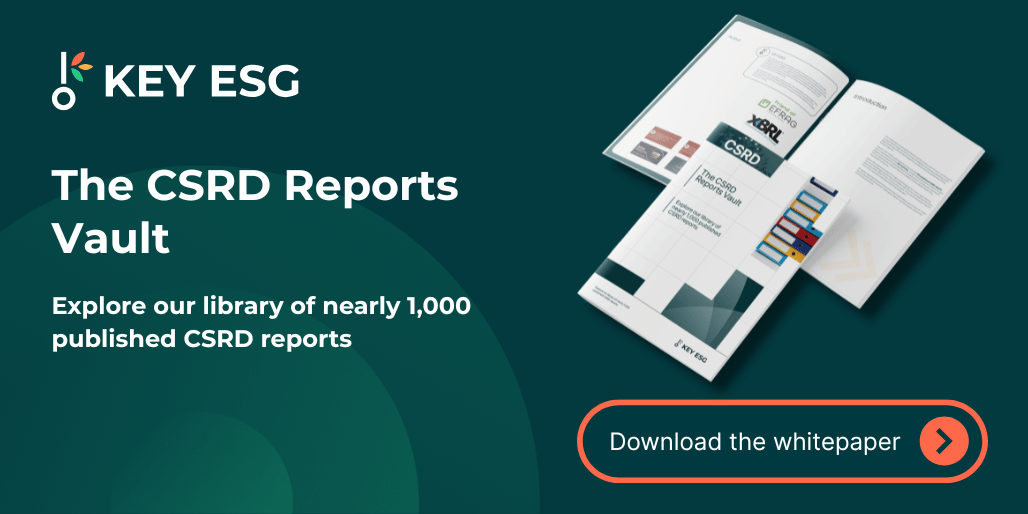At KEY ESG, we understand that every organisation’s sustainability journey is unique - and so are the metrics that matter most to them. That’s why we’re excited to launch our new Custom Calculated Metrics feature: a powerful new way for customers to define, track, and report on performance data tailored to their specific ESG strategies.
Why calculated metrics matter
KEY ESG's platform already provides robust functionality to create custom metrics, empowering companies and fund managers to measure and track the specific topics most relevant to their business. This flexible feature allows users to define unique data points through various field types, proving highly valuable for tailored ESG reporting.

When creating custom metrics, you can include detailed descriptions and guidance to help data contributors understand the purpose of the metric and how to source the required information. This intuitive, flexible functionality not only reduces the likelihood of errors but also improves data quality and minimises time spent fielding follow-up questions.
Our custom metrics feature is backed by a powerful combination of AI and expert human support, ensuring you receive fast and accurate assistance whenever questions arise.
Building on this strong foundation, we're now expanding these capabilities to enable more sophisticated metrics by combining data sources and creating calculated ratios that reflect operational realities with greater precision.
This new feature empowers users to combine existing simple metrics using Excel-like formulas, arithmetic expressions, and unit definitions - creating meaningful, auditable, and actionable data views.
What you can do with custom calculated metrics
Enhanced flexibility
Custom metrics can be precisely tailored to organisational goals. Want to track energy efficiency across different assets? Or measure diversity and inclusion performance beyond simple counts? You can now do exactly that - with full control over units, thresholds, and improvement indicators (i.e. whether "higher is better"). You can also set targets against custom calculated metrics and track your progress towards your objectives.
Target setting & progress tracking
Set specific targets against your custom calculated metrics and monitor your progress over time. This enables more meaningful goal alignment across teams and helps drive accountability toward sustainability objectives.
Streamlined ESG reporting
The KEY ESG platform includes pre-loaded data points for major reporting frameworks like SFDR, CSRD, IFRS and many more. However, every organisation has different priorities and different metrics. Custom calculated metrics ensure that all relevant sustainability information can be stored in the same platform with audit-ready traceability with full context and documentation embedded.
Watch the video below to see KEY ESG's custom calculated metrics in action.
Example use cases

1. Sustainable Mobility: Electrification Progress Tracker
A leading European ride-hailing platform wanted to demonstrate its progress towards electrifying its fleet. Using custom calculated metrics, they created:
- Total Number of Rides
- Number of Rides by Zero-Emission Vehicles (ZEVs)
- Percentage of Rides Completed by ZEVs = (ZEV rides / Total rides) × 100
This allowed them to:
- Benchmark performance across regions
- Satisfy CSRD and ESRS E1 requirements
- Provide transparent, investor-ready disclosures on climate transition plans
2. Food Manufacturing: CO₂ per Unit of Product
A large food manufacturer wanted product-level GHG emissions tracking. They used:
- Simple metrics for CO₂ emissions and Products Sold
- A calculated metric for CO₂ Intensity per Unit = CO₂ / Products Sold
Benefits included:
- Retailer-specific reporting on emission footprints
- Facility benchmarking across product types (bread, pastries, cakes)
- Support for Scope 3 accounting and eco-design decisions

3. Carbon Intensity per € Revenue
To support investor transparency, the same food manufacturer created:
- Emissions per Revenue (€) = Total Emissions / Revenue
This helped demonstrate:
- Decoupling of growth from emissions
- Trend insights on operational efficiency
- Financial stakeholder alignment with ESG targets
What’s next?
KEY ESG’s outstanding customer support team is ready to help you identify the best formulas and structures to suit your goals - whether that’s carbon intensity, social impact ratios, or anything else your ESG strategy demands.
Want to see how calculated metrics could work for your organisation? Book a demo or contact your Customer Success Manager today.
At KEY ESG, we understand that every organisation’s sustainability journey is unique - and so are the metrics that matter most to them. That’s why we’re excited to launch our new Custom Calculated Metrics feature: a powerful new way for customers to define, track, and report on performance data tailored to their specific ESG strategies.
Why calculated metrics matter
KEY ESG's platform already provides robust functionality to create custom metrics, empowering companies and fund managers to measure and track the specific topics most relevant to their business. This flexible feature allows users to define unique data points through various field types, proving highly valuable for tailored ESG reporting.

When creating custom metrics, you can include detailed descriptions and guidance to help data contributors understand the purpose of the metric and how to source the required information. This intuitive, flexible functionality not only reduces the likelihood of errors but also improves data quality and minimises time spent fielding follow-up questions.
Our custom metrics feature is backed by a powerful combination of AI and expert human support, ensuring you receive fast and accurate assistance whenever questions arise.
Building on this strong foundation, we're now expanding these capabilities to enable more sophisticated metrics by combining data sources and creating calculated ratios that reflect operational realities with greater precision.
This new feature empowers users to combine existing simple metrics using Excel-like formulas, arithmetic expressions, and unit definitions - creating meaningful, auditable, and actionable data views.
What you can do with custom calculated metrics
Enhanced flexibility
Custom metrics can be precisely tailored to organisational goals. Want to track energy efficiency across different assets? Or measure diversity and inclusion performance beyond simple counts? You can now do exactly that - with full control over units, thresholds, and improvement indicators (i.e. whether "higher is better"). You can also set targets against custom calculated metrics and track your progress towards your objectives.
Target setting & progress tracking
Set specific targets against your custom calculated metrics and monitor your progress over time. This enables more meaningful goal alignment across teams and helps drive accountability toward sustainability objectives.
Streamlined ESG reporting
The KEY ESG platform includes pre-loaded data points for major reporting frameworks like SFDR, CSRD, IFRS and many more. However, every organisation has different priorities and different metrics. Custom calculated metrics ensure that all relevant sustainability information can be stored in the same platform with audit-ready traceability with full context and documentation embedded.
Watch the video below to see KEY ESG's custom calculated metrics in action.
Example use cases

1. Sustainable Mobility: Electrification Progress Tracker
A leading European ride-hailing platform wanted to demonstrate its progress towards electrifying its fleet. Using custom calculated metrics, they created:
- Total Number of Rides
- Number of Rides by Zero-Emission Vehicles (ZEVs)
- Percentage of Rides Completed by ZEVs = (ZEV rides / Total rides) × 100
This allowed them to:
- Benchmark performance across regions
- Satisfy CSRD and ESRS E1 requirements
- Provide transparent, investor-ready disclosures on climate transition plans
2. Food Manufacturing: CO₂ per Unit of Product
A large food manufacturer wanted product-level GHG emissions tracking. They used:
- Simple metrics for CO₂ emissions and Products Sold
- A calculated metric for CO₂ Intensity per Unit = CO₂ / Products Sold
Benefits included:
- Retailer-specific reporting on emission footprints
- Facility benchmarking across product types (bread, pastries, cakes)
- Support for Scope 3 accounting and eco-design decisions

3. Carbon Intensity per € Revenue
To support investor transparency, the same food manufacturer created:
- Emissions per Revenue (€) = Total Emissions / Revenue
This helped demonstrate:
- Decoupling of growth from emissions
- Trend insights on operational efficiency
- Financial stakeholder alignment with ESG targets
What’s next?
KEY ESG’s outstanding customer support team is ready to help you identify the best formulas and structures to suit your goals - whether that’s carbon intensity, social impact ratios, or anything else your ESG strategy demands.
Want to see how calculated metrics could work for your organisation? Book a demo or contact your Customer Success Manager today.





.png)
